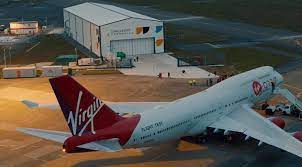U.K. government won’t buy Virgin Orbit

Washington : The British government, which helped buy OneWeb out of bankruptcy three years ago, has no plans to do the same with launch company Virgin Orbit, a government minister said May 17.
George Freeman, minister for science, innovation and technology in the U.K. government, told a Parliament committee that the government had “taken a close interest” in Virgin Orbit, which filed for Chapter 11 bankruptcy in the United States April 4, but had no plans to acquire the company.
“We’re not sitting here thinking of making a major acquisition, and acquiring and developing a U.K. sovereign launch capability,” he said when asked if the government would seek to ensure that the company was not broken up as part of the Chapter 11 restructuring process.
Virgin Orbit conducted the first orbital launch attempt from U.K. soil in January with a flight out of Spaceport Cornwall in England. However, a problem with the upper stage engine on the company’s LauncherOne rocket prevented it from reaching orbit.
The company’s license from the U.K. Civil Aviation Authority remains valid, but it is unclear if that would remain the case if the company is acquired as part of the bankruptcy process. Freeman, asked about that at the hearing, deferred that to the Department for Transport, reiterating that the government was not pursuing a deal for Virgin Orbit.
“As minister for the space industry here, we stand ready to support a specific proposal that looks sustainable — financially sustainable and commercially sustainable — but we’re not looking or in the business of making a major U.K. investment in acquiring a platform that hasn’t worked,” he said. While the Virgin Orbit launch from Cornwall failed, the company had recorded four consecutive successful launches before that failure.
Virgin Orbit is nearing the end of a bankruptcy sale process, with final bids due May 19. If the company receives more than one qualified bid, it will hold an auction May 22, with a hearing about the winning bid in federal bankruptcy court May 24.
In a May 16 court filing, Virgin Orbit announced a “stalking horse” bid agreement with Stratolaunch, who would buy Virgin Orbit’s Boeing 747 aircraft and related equipment for $17 million. That agreement effectively sets a minimum price for the auction, but allows others to offer higher bids for the aircraft, other assets or the entire company.
In the filing, Virgin Orbit said that Ducera Partners LLC, a company retained to help market its assets, had reached out to 204 potential bidders. Virgin Orbit previously said it had received more than 30 “indications of interest” that includes some who were interested in keeping Virgin Orbit operating. Virgin Orbit conducted “multiple rounds of negotiations” with Stratolaunch to secure the stalking horse bid agreement.
Stratolaunch has not commented publicly on its bid for Virgin Orbit’s aircraft. Stratolaunch has its own larger custom-built aircraft, dubbed Roc, which it originally created to serve as an air-launch platform. The company now plans to use Roc as a platform for launching hypersonic test vehicles it is developing, and conduced an unpowered drop test of one, Talon TA-0, on May 13 off the California coast.
Virgin Orbit executives had previously discussed using its LauncherOne system for applications other than satellite launch, including for hypersonics work or targets for missile defense tests.
Three years ago, the U.K. government did decide to help take a space company out of bankruptcy when it partnered with Indian telecom company Bharti Global to buy OneWeb for $1 billion. That broadband constellation provider had filed for Chapter 11 in March 2020.
French satellite operator Eutelsat is now working to close a deal to acquire OneWeb for $3.4 billion. That acquisition is expected to be completed this summer, Eva Berneke, chief executive of Eutelsat, said in a May 11 earnings call.
The U.K. government will retain priority voting rights, a so-called “golden share,” in OneWeb after the acquisition. That could complicate any role the system might play in the European Union’s Infrastructure for Resilience, Interconnectivity and Security by Satellite (IRIS²) constellation. Eutelsat is part of a consortium bidding on the system, but the United Kingdom is no longer part of the E.U.
“OneWeb’s future direction is obviously a matter for OneWeb. It’s a business, subject to commercial freedom,” Freeman said at the hearing, but added he was “delighted” that the government had its golden share in the company.
“We do view our shareholding in OneWeb as a major lever for our commercial space strategy,” he said, with discussions underway with both the European Space Agency and the European Union. “We believe there’s a very significant win-win here if OneWeb decides, through the Eutelsat acquisition, that they want to be and can be part of the IRIS² system.”
“We would certainly want to make sure that, through our golden share, we have a significant piece of the manufacturing here in the U.K. and potentially launch here in the U.K.,” he said. Berneke said in the earnings call that the OneWeb merger deal includes a clause that would remove British government control out of a part of OneWeb’s second-generation constellation.





